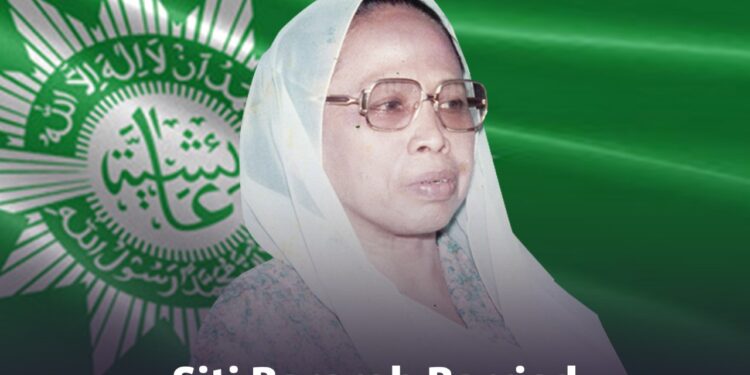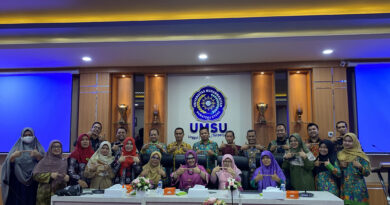Prof. Siti Baroroh Bared, Member of PP Muhammadiyah
The 36th congress in 1965 in Bandung became a new chapter in the leadership system in the management structure of the Muhammadiyah Central Executive (PP). Leadership in PP Muhammadiyah was no longer filled entirely by men, because at that time, Siti Baroroh Baried and Siti Aisyah Hilal were included in the ranks of PP Muhammadiyah.
Siti Ruhaini Dzuhayatin in her research which was published as a book in 2015 entitled “Muhammadiyah Gender Regime: Contestation of Gender, Identity and Existence” said that the involvement of women in the ranks of Muhammadiyah administrators experienced tug-of-war.
At the 36th Muktamar in 1965 Muhammadiyah accommodated women’s involvement in the management of PP. Accommodating women’s involvement in management at PP Muhammadiyah was strengthened again through the Tanwir Decree in Denpasar in 2002, it was proposed that the ex officio chairman of ‘Aisyiyah or one of the members of PP ‘Aisyiyah become a member of the chairman of PP Muhammadiyah.
However, there was a change regarding the participation of women in leadership among members of PP Muhammadiyah, because at the 45th Congress the participation of women as members of PP Muhammadiyah was canceled by the congress forum. However, at the 46th Congress, this incident did not repeat itself, because there was Siti Noordjannah Djohantini who was a member of PP Muhammadiyah for the 2015-2020 period.
Apart from that, the role of women in Muhammadiyah cannot be underestimated by both external and internal circles. Their work is not only for the Muhammadiyah and ‘Aisyiyah circles. For example, the work of the Chairperson of PP ‘Aisyiyah for the period 1965-1985, Siti Baroroh Bared.
Who is Siti Baroroh Baried?
Siti Baroroh Bared listed her name as the first female professor in Indonesia. Leading ‘Aisyiyah for 20 years was not an obstacle for her to make achievements in her academic career. He was registered as a Professor at the Faculty of Letters, Gadjah Mada University (UGM) on October 27 1964, when he was 39 years old, a relatively young age for a Professor.
Siti Baroroh Bared was born in Yogyakarta on May 23, 1923 to Tamim bin Dja’far and Siti Asmah bint Muchammad. Based on lineage, Siti Baroroh Bared is still a relative of Siti Walidah from her father’s line. Because Dja’far is the grandson of Kiai Fadhil who is the father of Siti Walidah, the founder of ‘Aisyiyah. This means that Dja’far is the nephew of Siti Walidah.
Since childhood, Siti Baroroh was educated in a family that was steeped in Islam. This style of education then built Siti Baroroh’s identity into a devout Muslim, and consistent with what she was involved in. Uswatun Chasanah in the magazine Suara ‘Aisyiyah No. 7 of 1999 wrote, Siti Baroroh among academics is known as a good and tenacious figure in the academic field.
In her daily life, Siti Baroroh is also known as a Javanese Muslim woman who has a simple appearance, is diligent, and really respects her parents. Even though she is known as an intelligent and forward-looking woman, Siti Baroroh cannot escape her identity as a progressive Muslim woman. He is married to Dr. Baried Ishom is a specialist doctor at PKU Muhammadiyah Hospital Yogyakarta.
Regarding the husband-wife relationship between Siti Baroroh Baried and Dr. Ishom Baried can be found from the results of an interview with Siti Hadiroh, Secretary of PP ‘Aisyiyah III 1995-2000, Chair 2000-2010 and 2010-2015 conducted by Fairuz Salma Rafifah for her thesis assignment at the History of Islamic Civilization Study Program at IAIN Salatiga in 2020.
It was stated that the husband and wife had quite a big age difference, where Ishom Baried was 8 years younger than Baroroh. However, this does not reduce Baroroh’s respect and obedience to her husband. Despite her many achievements, Siti Baroroh still carries out her duties as a wife well.
The relationship between men and women is not seen structurally but functionally. However, Siti Baroroh does not approve of excessive emancipation which is contrary to religious and cultural norms. In relation to this, he said that women have 3 worlds, namely the world of family, the world of career and the world of society.
Internationalization of ‘Aisyiyah
Since she was young, Siti Baroroh Baried has had the motto “In my life I must seek knowledge”, this motto was conveyed directly to her parents. This motto was truly implemented in her life, she could not stay away from the academic world, leading to her becoming the first female Professor in Indonesia.
In the book “100 Inspiring Muhammadiyah Figures” published by the PP Muhammadiyah Literature and Information Council (MPI) in 2014, it was stated that Siti Baroroh started her education at Muhammadiyah Elementary School, then successively continued at MULO HIK Muhammadiyah, UGM Faculty of Letters (Baccalaureate), UI Faculty of Letters in Jakarta, until studying Arabic in Cairo, Egypt in 1953-1955.
This ability and knowledge has had a big influence on ‘Aisyiyah, the international network it has is used to make ‘Aisyiyah’s name famous in the international arena through building relationships with international bodies such as UNICEF, UNESCO, WHO, The Asia Foundation, World Conference of Religion and Peace, UNFPA, UNDP, World Bank, and many others.
Mentioned in the book “Percik Thoughts of Muhammadiyah Figures for the Progress of the Nation” published by MPI PP Muhammadiyah in 2018. Before serving as General Chair of PP ‘Aisyiyah, Siti Baroroh started her career at PP ‘Aisyiyah as Chair of the PP ‘Aisyiyah Public Relations Bureau which enabled her to synergize networks and capabilities academics with the ‘Aisyiyah internationalization program. Apart from being in the Middle East because she is an Egyptian graduate, Siti Baroroh also carries the name ‘Aisyiyah in Western countries.
Siti Baroroh to Harvard
For example, at a seminar at Harvard University, United States, Siti Baroroh delivered a presentation entitled Aisyiyah and The Social Change Women of The Indonesian. This had an impact on ‘Aisyiyah, through seminars and its network of international relations, it made ‘Aisyiyah and its movement begin to be known internationally.
His visits abroad bore sweet fruit, because starting in 1972 the ‘Aisyiyah Organization not only partnered with the government and other domestic organizations. In that year, ‘Aisyiyah collaborated with OEF (Overseas Education Fund), in a training program to increase cadre capacity.
Apart from that, in the same year ‘Aisyiyah also collaborated with The Pathfinder Fund in the field of economic development. Collaboration with OEF opened the doors to other collaboration networks with international organizations, because after the collaboration with OEF ended, ‘Aisyiyah then collaborated with The Asia Foundation in the 1980s.
Traces of the internationalization of the ‘Aisyiyah Organization still exist today and are even continuing to grow. Not only in the focus of increasing cadre capacity, ‘Aisyiyah is also trusted by the Indonesian Embassy in Phnom Penh to help increase the capacity of Muslims in Cambodia. Apart from that, ‘Aisyiyah also has ‘Aisyiyah Special Branch Leaders in Cairo – Egypt, Malaysia, Hong Kong, Taiwan, Australia and Sudan.




